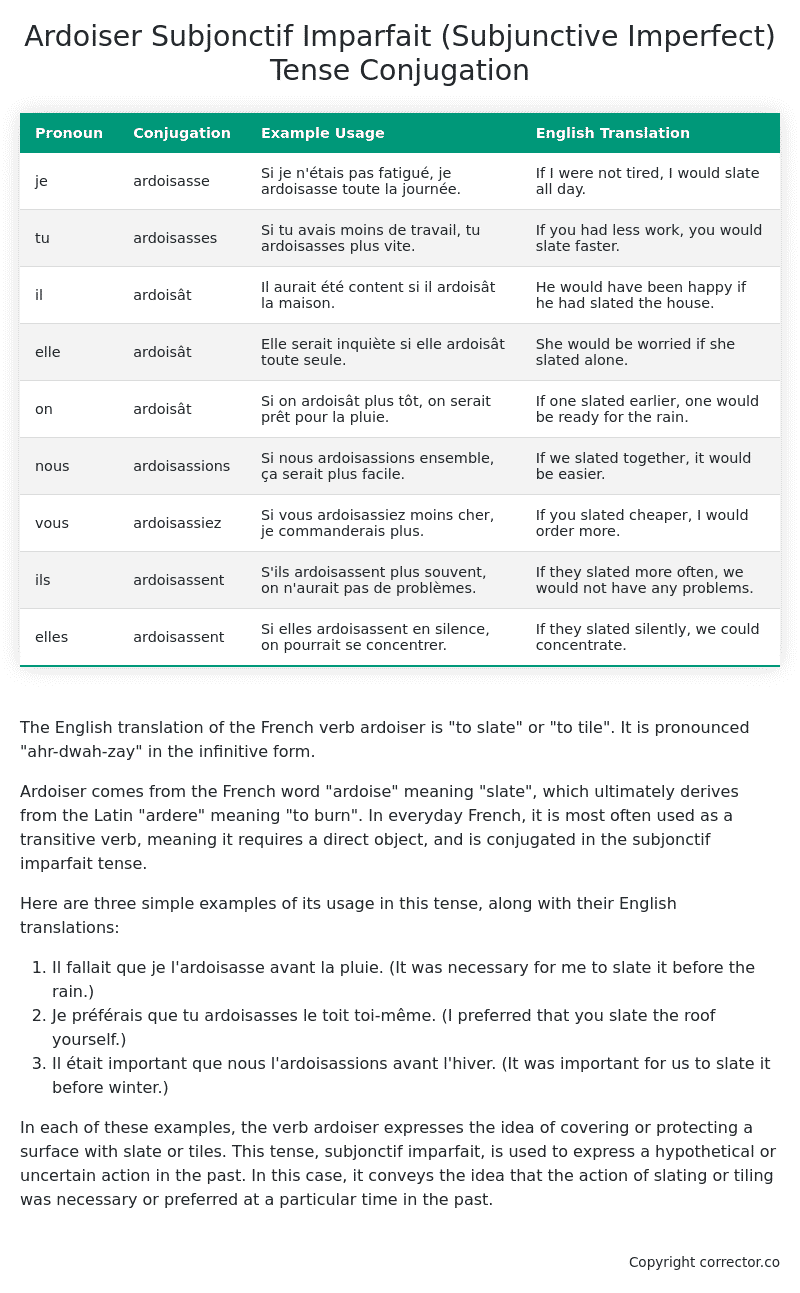Subjonctif Imparfait (Subjunctive Imperfect) Tense Conjugation of the French Verb ardoiser
Introduction to the verb ardoiser
The English translation of the French verb ardoiser is “to slate” or “to tile”. It is pronounced “ahr-dwah-zay” in the infinitive form.
Ardoiser comes from the French word “ardoise” meaning “slate”, which ultimately derives from the Latin “ardere” meaning “to burn”. In everyday French, it is most often used as a transitive verb, meaning it requires a direct object, and is conjugated in the subjonctif imparfait tense.
Here are three simple examples of its usage in this tense, along with their English translations:
- Il fallait que je l’ardoisasse avant la pluie. (It was necessary for me to slate it before the rain.)
- Je préférais que tu ardoisasses le toit toi-même. (I preferred that you slate the roof yourself.)
- Il était important que nous l’ardoisassions avant l’hiver. (It was important for us to slate it before winter.)
In each of these examples, the verb ardoiser expresses the idea of covering or protecting a surface with slate or tiles. This tense, subjonctif imparfait, is used to express a hypothetical or uncertain action in the past. In this case, it conveys the idea that the action of slating or tiling was necessary or preferred at a particular time in the past.
Table of the Subjonctif Imparfait (Subjunctive Imperfect) Tense Conjugation of ardoiser
| Pronoun | Conjugation | Example Usage | English Translation |
|---|---|---|---|
| je | ardoisasse | Si je n’étais pas fatigué, je ardoisasse toute la journée. | If I were not tired, I would slate all day. |
| tu | ardoisasses | Si tu avais moins de travail, tu ardoisasses plus vite. | If you had less work, you would slate faster. |
| il | ardoisât | Il aurait été content si il ardoisât la maison. | He would have been happy if he had slated the house. |
| elle | ardoisât | Elle serait inquiète si elle ardoisât toute seule. | She would be worried if she slated alone. |
| on | ardoisât | Si on ardoisât plus tôt, on serait prêt pour la pluie. | If one slated earlier, one would be ready for the rain. |
| nous | ardoisassions | Si nous ardoisassions ensemble, ça serait plus facile. | If we slated together, it would be easier. |
| vous | ardoisassiez | Si vous ardoisassiez moins cher, je commanderais plus. | If you slated cheaper, I would order more. |
| ils | ardoisassent | S’ils ardoisassent plus souvent, on n’aurait pas de problèmes. | If they slated more often, we would not have any problems. |
| elles | ardoisassent | Si elles ardoisassent en silence, on pourrait se concentrer. | If they slated silently, we could concentrate. |
Other Conjugations for Ardoiser.
Le Present (Present Tense) Conjugation of the French Verb ardoiser
Imparfait (Imperfect) Tense Conjugation of the French Verb ardoiser
Passé Simple (Simple Past) Tense Conjugation of the French Verb ardoiser
Passé Composé (Present Perfect) Tense Conjugation of the French Verb ardoiser
Futur Simple (Simple Future) Tense Conjugation of the French Verb ardoiser
Futur Proche (Near Future) Tense Conjugation of the French Verb ardoiser
Plus-que-parfait (Pluperfect) Tense Conjugation of the French Verb ardoiser
Passé Antérieur (Past Anterior) Tense Conjugation of the French Verb ardoiser
Futur Antérieur (Future Anterior) Tense Conjugation of the French Verb ardoiser
Subjonctif Présent (Subjunctive Present) Tense Conjugation of the French Verb ardoiser
Subjonctif Passé (Subjunctive Past) Tense Conjugation of the French Verb ardoiser
Subjonctif Imparfait (Subjunctive Imperfect) Tense Conjugation of the French Verb ardoiser (this article)
Subjonctif Plus-que-parfait (Subjunctive Pluperfect) Tense Conjugation of the French Verb ardoiser
Conditionnel Présent (Conditional Present) Tense Conjugation of the French Verb ardoiser
Conditionnel Passé (Conditional Past) Tense Conjugation of the French Verb ardoiser
L’impératif Présent (Imperative Present) Tense Conjugation of the French Verb ardoiser
L’infinitif Présent (Infinitive Present) Tense Conjugation of the French Verb ardoiser
Struggling with French verbs or the language in general? Why not use our free French Grammar Checker – no registration required!
Get a FREE Download Study Sheet of this Conjugation 🔥
Simply right click the image below, click “save image” and get your free reference for the ardoiser Subjonctif Imparfait tense conjugation!

Ardoiser – About the French Subjonctif Imparfait (Subjunctive Imperfect) Tense
Formation
Common Everyday Usage Patterns
Interactions with Other Tenses
Subjonctif Présent
Indicatif Passé Composé
Conditional
Conditional Perfect
Summary
I hope you enjoyed this article on the verb ardoiser. Still in a learning mood? Check out another TOTALLY random French verb conjugation!


